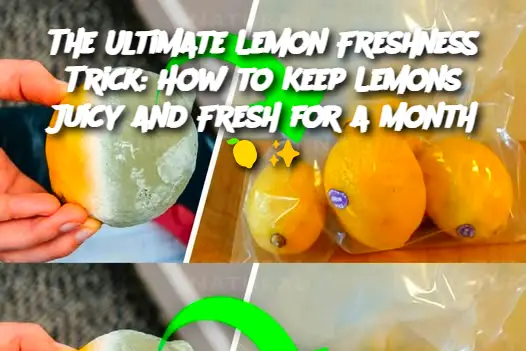Step 7: Place the container in the refrigerator. The cool temperature will slow down the ripening process and keep the lemons fresh for a longer period.
Enjoy Fresh Lemons for a Month:
Step 8: Your lemons should now stay fresh, juicy, and ready to use for up to a month! Simply remove them from the container when you need them, and store them back in the fridge if not all used up. If you notice any water evaporation, replace it with fresh water.
Tips for Serving and Storing:
Use Fresh Water: If you notice the water is becoming cloudy or dirty over time, replace it with fresh water. This will help keep the lemons hydrated and prevent any bacterial growth.
Keep the Container Sealed: Ensure that the airtight container is properly sealed to maintain the humidity and prevent moisture from escaping.
Store Whole Lemons Only: This method works best for whole lemons. Once a lemon is cut, it will spoil much faster and should be used within a few days.
Avoid Storing with Other Produce: While lemons are generally fine in the fridge, they do best on their own, away from other fruits that emit ethylene gas (like apples or bananas) which can speed up spoilage.
Variants:
Without Salt or Vinegar: If you prefer a more natural method, you can skip adding salt or vinegar to the water. While these ingredients can help extend shelf life, the simple water solution still does a great job in preserving freshness.
For Sliced Lemons: If you have sliced or juiced lemons, you can store them in an airtight container with a little water, but it’s best to consume them within a few days. If you plan to use lemon slices in drinks, freezing them is a great option.
Lemon Juice Storage: If you have leftover lemon juice, consider freezing it in ice cube trays. Once frozen, you can store the cubes in a freezer bag, and you’ll have fresh lemon juice on hand for months!
FAQ:
1. Why does this method work to keep lemons fresh?
The key to this method is hydration. By storing the lemons in water, you help maintain their moisture, preventing them from drying out and losing their juiciness. The cool refrigerator temperature also slows down the ripening process, keeping them fresh longer.
2. Can I store lemons this way at room temperature?
No, storing lemons at room temperature can cause them to ripen and spoil much faster. The refrigerator is crucial for maintaining their freshness for up to a month.
3. Do I need to change the water every few days?
Ideally, yes. Changing the water every few days keeps the lemons hydrated and ensures that no bacteria or mold begins to grow. If you notice the water looks dirty or cloudy, it’s a good idea to replace it.
4. Can I use this method for limes as well?
Yes, this method can be used for limes, too. It works just as well for preserving their juiciness and freshness. Just be sure to use fresh water and an airtight container.
5. How can I tell if a lemon has gone bad?
If a lemon starts to turn soft, has a noticeable change in color (like becoming brown or black), or starts to emit a sour or rotten smell, it has gone bad. A fresh lemon should feel firm and heavy for its size, with vibrant, yellow skin.
With this simple yet effective trick, you can keep your lemons fresh, juicy, and ready to use for a whole month! Say goodbye to wasting lemons and hello to a constant supply of vibrant, flavorful fruit in your fridge. Whether you’re using them in cooking, baking, or for a refreshing glass of lemonade, your lemons will stay perfect longer with minimal effort. Try it today and experience the difference! 🍋✨
ADVERTISEMENT

